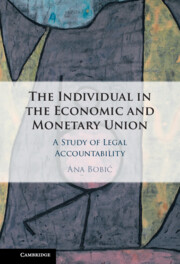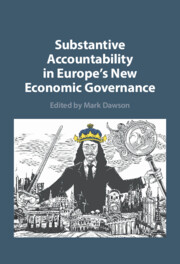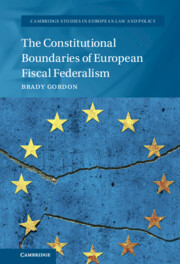Refine search
Actions for selected content:
29 results
The EU’s neoliberal constitutionalism(s)
-
- Journal:
- European Law Open / Volume 3 / Issue 4 / December 2024
- Published online by Cambridge University Press:
- 06 February 2025, pp. 705-745
-
- Article
-
- You have access
- Open access
- HTML
- Export citation
Conflicts-law constitutionalism in the EMU: how much unity can European diversity sustain?
-
- Journal:
- European Law Open / Volume 4 / Issue 1 / March 2025
- Published online by Cambridge University Press:
- 09 January 2025, pp. 43-58
-
- Article
-
- You have access
- Open access
- HTML
- Export citation
1 - Introduction
-
- Book:
- Politicising Commodification
- Published online:
- 30 May 2024
- Print publication:
- 06 June 2024, pp 1-10
-
- Chapter
-
- You have access
- Open access
- HTML
- Export citation

The Individual in the Economic and Monetary Union
- A Study of Legal Accountability
-
- Published online:
- 04 January 2024
- Print publication:
- 25 January 2024
-
- Book
-
- You have access
- Open access
- Export citation
1 - From Procedural to Substantive Accountability in EMU Governance
- from Part I - (Re)theorising Accountability in EMU
-
-
- Book:
- Substantive Accountability in Europe's New Economic Governance
- Published online:
- 23 November 2023
- Print publication:
- 07 December 2023, pp 19-44
-
- Chapter
-
- You have access
- Open access
- HTML
- Export citation

Substantive Accountability in Europe's New Economic Governance
-
- Published online:
- 23 November 2023
- Print publication:
- 07 December 2023
-
- Book
-
- You have access
- Open access
- Export citation
Openness, Purposiveness, and the Realignment of the EU and the Democratic and Social Constitutional State
-
- Journal:
- German Law Journal / Volume 24 / Issue 7 / November 2023
- Published online by Cambridge University Press:
- 03 November 2023, pp. 1099-1126
-
- Article
-
- You have access
- Open access
- HTML
- Export citation
Euro as the currency of the EU’s green transition
-
- Journal:
- European Law Open / Volume 1 / Issue 4 / December 2022
- Published online by Cambridge University Press:
- 14 April 2023, pp. 1048-1058
-
- Article
-
- You have access
- Open access
- HTML
- Export citation
5 - Sustainability and Eurozone 2.0
- from Part II - The (UN)Sustainability of the EU Economic System
-
-
- Book:
- Sustainable Value Creation in the European Union
- Published online:
- 01 December 2022
- Print publication:
- 15 December 2022, pp 113-130
-
- Chapter
- Export citation
Introduction
-
- Book:
- The New Economic Governance of the Eurozone
- Published online:
- 14 July 2022
- Print publication:
- 28 July 2022, pp 1-24
-
- Chapter
- Export citation
3 - The Failure and Abrogation of the Maastricht Model
- from Part I
-
- Book:
- The Constitutional Boundaries of European Fiscal Federalism
- Published online:
- 07 April 2022
- Print publication:
- 14 April 2022, pp 137-198
-
- Chapter
- Export citation
8 - Principles of Fiscal Federalism for the European Union
- from Part II
-
- Book:
- The Constitutional Boundaries of European Fiscal Federalism
- Published online:
- 07 April 2022
- Print publication:
- 14 April 2022, pp 337-410
-
- Chapter
- Export citation
2 - The Maastricht Architecture of European Fiscal Federalism
- from Part I
-
- Book:
- The Constitutional Boundaries of European Fiscal Federalism
- Published online:
- 07 April 2022
- Print publication:
- 14 April 2022, pp 106-136
-
- Chapter
- Export citation
Conclusion
- from Part II
-
- Book:
- The Constitutional Boundaries of European Fiscal Federalism
- Published online:
- 07 April 2022
- Print publication:
- 14 April 2022, pp 411-417
-
- Chapter
- Export citation
4 - Constitutional Criteria for EU Fiscal Federalism
- from Part I
-
- Book:
- The Constitutional Boundaries of European Fiscal Federalism
- Published online:
- 07 April 2022
- Print publication:
- 14 April 2022, pp 199-200
-
- Chapter
- Export citation
5 - The Emergent Centralized Architecture of European Fiscal Federalism
- from Part II
-
- Book:
- The Constitutional Boundaries of European Fiscal Federalism
- Published online:
- 07 April 2022
- Print publication:
- 14 April 2022, pp 203-215
-
- Chapter
- Export citation
7 - The Constitutional Boundaries of Member State Fiscal Sovereignty
- from Part II
-
- Book:
- The Constitutional Boundaries of European Fiscal Federalism
- Published online:
- 07 April 2022
- Print publication:
- 14 April 2022, pp 261-336
-
- Chapter
- Export citation
6 - The Constitutional Boundaries of Economic and Monetary Union under EU Law
- from Part II
-
- Book:
- The Constitutional Boundaries of European Fiscal Federalism
- Published online:
- 07 April 2022
- Print publication:
- 14 April 2022, pp 216-260
-
- Chapter
- Export citation
1 - The Constitutional Boundaries of European Fiscal Federalism
- from Part I
-
- Book:
- The Constitutional Boundaries of European Fiscal Federalism
- Published online:
- 07 April 2022
- Print publication:
- 14 April 2022, pp 24-105
-
- Chapter
- Export citation

The Constitutional Boundaries of European Fiscal Federalism
-
- Published online:
- 07 April 2022
- Print publication:
- 14 April 2022
